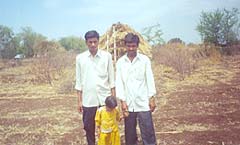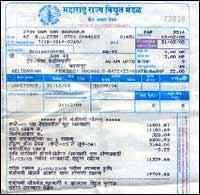 Along the road to Jalna from Aurangabad in Maharashtra's Marathwada region you see fields -- all dry and black.
Along the road to Jalna from Aurangabad in Maharashtra's Marathwada region you see fields -- all dry and black.
In one field you see emaciated sheep grazing on arid land.
In another field one spies a well-fed buffalo and a huge goat. They belong to a farmer, who has a five-acre farm but no work.
 Gajanan Mulak lives in a small hut on the farm. He has just 15 feet of water left in his well, which he uses very sparingly.
Gajanan Mulak lives in a small hut on the farm. He has just 15 feet of water left in his well, which he uses very sparingly.
To top it, he has to spend most part of the day without power.
His mother says five years ago there was no power crisis.
It all started two years ago with the Maharashtra State Electricity Board enforcing two hour cuts a day, which gradually increased to four hours a day.
However, villagers say they don't have power for more than six hours daily.
Anyway, even if there is power there is no water to pump, he laments.
When the monsoon arrives, his father Gopinath will sow cotton in the fields.
If there is sufficient rains he might sow jowar and bajra too.
The Mulaks gets their drinking water from a restaurant near their home.
The restaurant owner has a borewell that draws water from a depth of 150 feet.
 Gopinath is lucky that though he is a farm labourer, he gets a monthly salary.
Gopinath is lucky that though he is a farm labourer, he gets a monthly salary.
His employer pays him Rs 2,000 a month even if there is no work on the farm. He guards the field and feeds the animals.
Gajanan married recently. You ask him about his honeymoon and he retorts, "When there is no money for food, who can think of a honeymoon?"
He works part time in the construction industry to support his family.
Off the highway near Jalna lies Salegaon village.
The land here is uneven and there are no proper roads. The nearest nursing home is six kilometres away.
In nearby Kelegahaon village most people have not paid electricity bills for the past 10 years.
Asks Seshrao Namdeo Madan: "When we have not been provided drinking water for 10 years why should we pay electricity bills?"
His house has a television but no fan. "What's the use of a fan without power? The television was there for the kids when we had power."
This village has nine hour power cuts. What they don't know is whatever little power they have been getting for the last two years is free.
Then there are the 'regulars' -- the people who actually pay electricity bills and bank loans.
One such 'regular' told us it was true he had not received a bill for agricultural power in a year. Earlier, he used to get them and had paid them.
Power cuts in this village have been common for five years now. But 2005 has been the worst year so far.
When they didn't pay their bills, the electricity board cut their power by removing the fuse.
The villagers simply reconnected the fuse. The officials returned and removed it. The process continues... and the villagers enjoy whatever little electricity they get.
The villagers' grouse is that they have no source of water except rain.
Groundwater has depleted so much that a three horsepower pump cannot draw water from any well for more than 15 minutes.
This is only enough water for drinking, not for agriculture.
Fifteen years ago, the government tried to build a dam on the local Satwar canal, but failed because of lack of cooperation from the big farmers.
Ask the MSEB about the problem and the officials talk about their 'successful' Akshay Prakash Yojana.
Under this scheme the villagers were advised not to steal electricity but use pumps between 5 pm and 11 pm.
The electricity board ensured there was no power cut in the village between 5 pm and 11 pm.
MSEB officials said a good example of this scheme was Gadana village in Kultabad taluka.
Gadana is 26 km from Aurangabad, on the road to the famous Ellora Caves.
However, the villagers there had a different story to tell.
The Akshay Prakash Yojana worked for four days after the scheme was launched, during which there were no power cuts.
It was back to square one after that, say the villagers.
When we mentioned the Prakash Yojana, they laughed. "Why don't you stay the night here and see for yourself?" was their advice.
The MSEB had told them not to use pumps during peak hours.
The villagers told them: "We never used pumps at all because there is no water in the wells."
Photographs: A Ganesh Nadar








